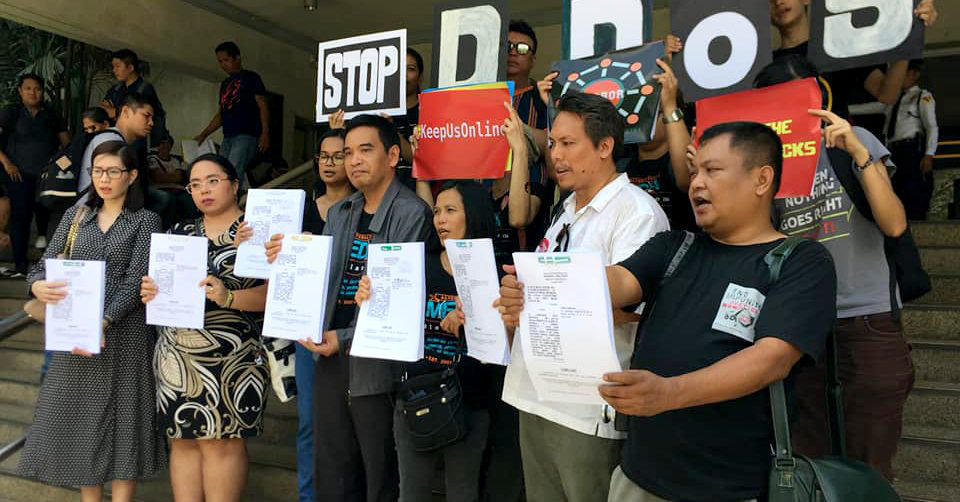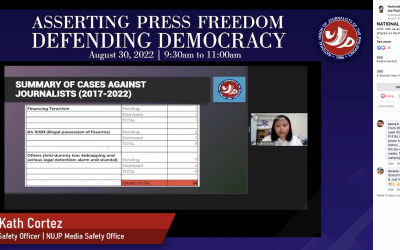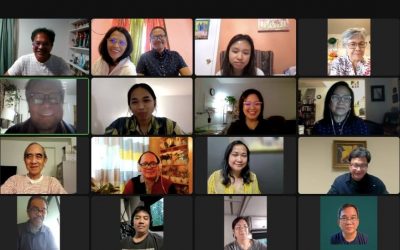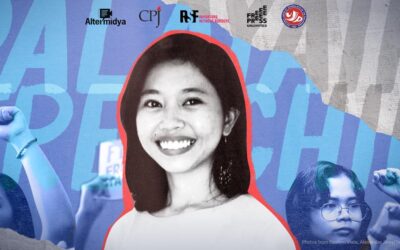Alternative and campus press bear brunt of, endure government attacks
by Raymund B. Villanueva
MANILA — The alternative media community and the campus press in the Philippines are being subjected to unrelenting attacks on press freedom by Duterte government as much as, if not worse, than dominant media outfits.
It is a testament to the plucky determination of their journalists that these small and independent outfits have only gone from strength to strength in the past five years.
In the process, they not only helped in documenting the sordid human rights situation in the country, they helped expose and fight brazen violations to the Filipino people’s right to a free press and freedom of expression.
The alternative press under Duterte
The alternative press suffered what was described by global digital rights activists as the worst cyber attacks against media organizations in the world.
Simultaneously, Kodao Productions, Bulatlat.com, Pinoy Weekly and Altermidya websites were repeatedly shut down by distributed denial of service attacks (DDOS) that often collectively reached hundreds of millions of disruptions a day from December 2017 to March 2018.
The alternative media outfits sought the help of the Department Information and Communication Technology but were ignored.
Fortunately, international digital rights groups took up their cause, conducted 24/7 surveillance and got lucky one day.
A local troll operator from Makati forgot to use a Virtual Private Network to mask her Makati City location in issuing orders to attack Kodao’s website.
The experts found out that the attacks were using part of a local digital company’s infrastructure that was being rented to a Chinese-Filipino construction firm registered in Taguig City.
The four media outfits filed a complaint before the Quezon City Regional Trial in March 2018 that immediately resulted in stopping the DDOS attacks, confirming who the attackers were and who were possibly behind them. The case was eventually settled out of court after months of arbitrated discussions with the respondents.
The alternative press’ battle with cyber attacks proved historic as it was the first time that a well-funded DDOS attack was successfully defeated and its perpetrators were hailed to court.
Their fight provided the global digital rights community one of its earliest significant victories that now serves as an example to all cause-oriented websites on how to fight cyber attacks.
Since 2016, members of the alternative press also suffered the following:
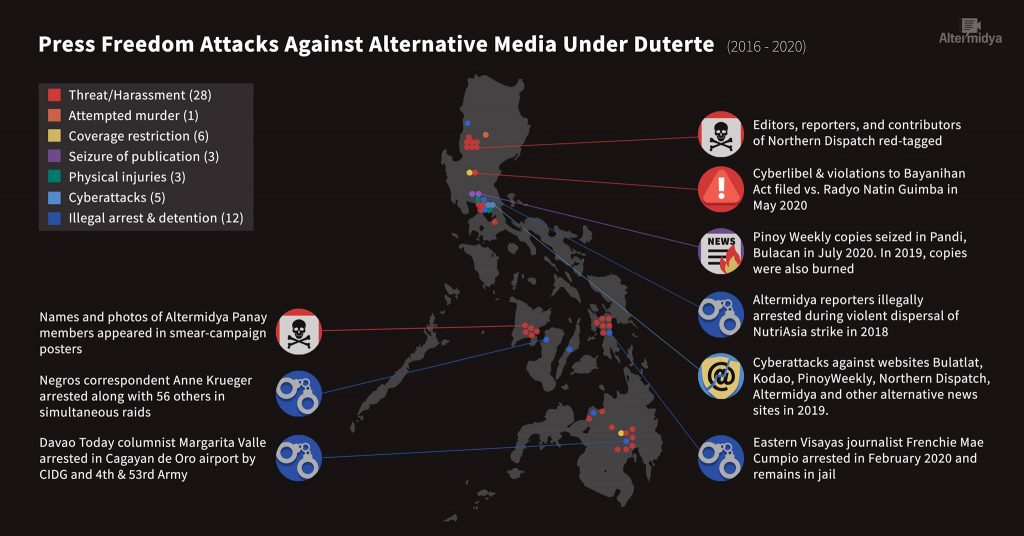
While there have been 12 arrests and detentions among alternative journalists since the start of the Duterte government, three of its women members were charged with crimes aimed at keeping them in jail for a long time.
On October 31, 2019, Pahimutad reporter Anne Krueger was arrested with 56 unionists and activists in Bacolod City.
On February 7, 2020, Eastern Vista executive director Frenchie Mae Cumpio was arrested in Tacloban City with four other activists.
And on International Human Rights Day last December 10, 2020, Manila Today editor Lady Ann Salem was arrested in Mandaluyong City along with six other labor organizers in operations across Metro Manila.
All three were arrested in similar fashion and were accused of the same crimes. The three alternative journalists were arrested at night or early morning in simultaneous raids of offices and houses, using search warrants issued by courts located in faraway places, and accused of illegal possession of firearms and explosives.
Absurdly, Salem was even accused by the police of being a member of a gun-running syndicate.
Krueger’s quick-thinking act of publishing a live video of the police raid helped convince the local court to allow her to post bail a few days after her arrest.
The police’s inconsistent testimonies against Salem convinced a local judge to declare her arrest illegal.
Cumpio, however, has been languishing in jail for more than a year already.
Worse than their unjust arrests and incarceration, Davao Today’s Margarita Valle was held incommunicado for more than a day when she was falsely identified and arrested by the police as a New People’s Army rebel.
She was handcuffed, blindfolded and taken to a far-away police camp on June 9, 2019.
Northern’s Dispatch’s Brandon Lee was shot multiple times in front of his daughter in Lagawe, Ifugao on August 6, 2019 by suspected Philippine Army personnel.
His ambulance was tailed by assassins who also tried to barge into his hospital room in Baguio City. He was eventually flown by a medical plane to the United States. He is now paralyzed from the waist-down.
The campus press fights on
The campus press and student journalists are not being spared the worst of the attacks against press freedom by the Duterte government. Like their alternative press colleagues, they are being accused of recruiting for the New People’s Army.
Repeatedly and on a nationwide scale, posters are being distributed listing the College Editors’ Guild of the Philippines as a youth organization fronting for the Communist Party of the Philippines.
No less than the National Task Force to End Local Communist Armed Conflict (NTF-ELCAC) is leading the way in threatening student publications and campus journalists, such as the case of Tug-ani of the University of the Philippines in Cebu.
Denisse Macalino, CEGP Central Luzon chairperson, Luzon was subjected to red-tagging by the same page attacking the editors of Holy Angel University’s The Angelite of Angeles City.
Klenia Mendiola and John Marco Magdangal, editor in chief and associate editor of the student publication, were red-tagged by the page “Samahang Kontra sa Makakaliwa”.
Even University of the Philippines (UP) and Polytechnic University of the Philippines (PUP) networks of student publications as well as student journalism organizations such as the Union of Journalists of the Philippines-UP Diliman are red-tagged and, worse, subjected to death threats.
NTF-ELCAC accused the Alyansa ng Kabataang Mamamahayag ng PUP of being NPA recruiters last January 29 .
UP Solidaridad was among those accused of being terrorists and was threatened with, “Binabalaan namin kayo. Itigil niyo na ang ginagawa niyo. Kung ayaw niyong itumba namin kayo.”
CEGP Deputy Secretary-General Regina Tolentino received a death threat from a suspected dummy account, saying “…bilang na araw mo…bumitaw k na hangat may panahon pa…” last November 2.
Even local politicians are in on the harassment as when Cebu Gov. Gwendolyn Garcia berated Today’s Carolinian editor in chief Berns Mitra of the University of San Carlos at the start of the pandemic lockdowns last year.
As if these were not enough, state university student publications are also being increasingly defunded by administrators. Dozens of student publications that were threatened with defunding were included in a 12-page complaint filed by the CEGP to the Commission on Higher Education lat July, but has yet to receive a reply.
Despite all the hardships it endures under the Duterte government, however, the alternative press is proving it is here to stay while the campus press perseveres.
Both have covered many stories that have slipped the attention of the dominant press. It has also provided the most consistent support to the mainstream press that have come under attack, such as ABS-CBN and Rappler.
In the current alternative media and the campus press live the glorious traditions of the mosquito press under Ferdinand Marcos’s dictatorship.
More from Diarista 2021
On 1st National Press Freedom Day, NUJP vows to fight ‘lawfare’ against the media
PHOTO: Kath Cortez, NUJP Media safety officer, talks about the cases recorded by NUJP Safety Office. MANILA — In observance of the first National Press Freedom Day in the Philippines last August 30,...
NUJP North America formed
NUJP North America first online general assembly. MANILA — The National Union of Journalists of the Philippines (NUJP) North America chapter was established July 1 during an online assembly....
Masked Media campaign bags awards
Masked Media Campaign won 2 Golds, a Silver and a Bronze at APAC Tambuli Awards, a pioneer global award show that recognizes effective brands with purpose. MANILA — It’s another win for press...

